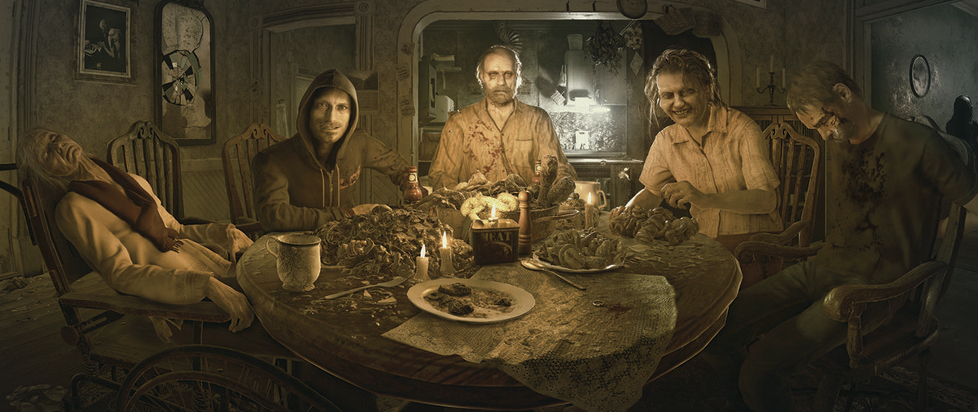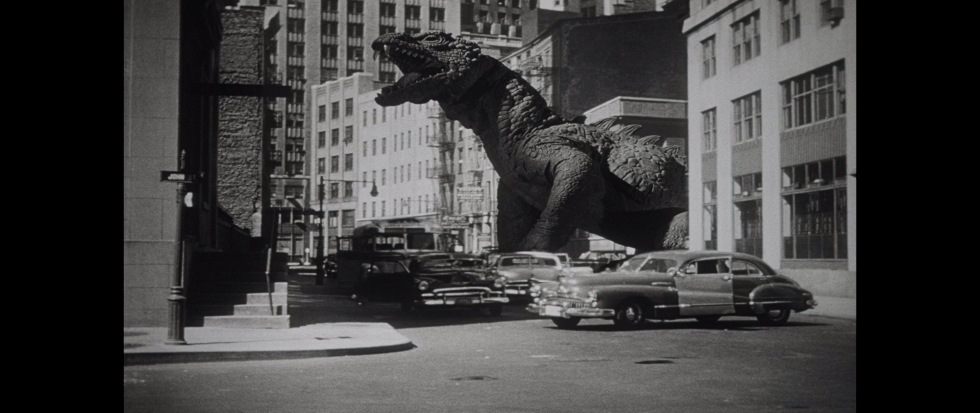
Checkpoint – Resident Boring
 Corey Milne stands at the intersection of gaming and world history to see what he can see.
Corey Milne stands at the intersection of gaming and world history to see what he can see.
———
This column is a reprint from Unwinnable Monthly #9o. If you like what you see, grab the magazine for less than ten dollars, or subscribe and get all future magazines for half price.
———
There was a moment early on when I think I knew Resident Evil 7 wasn’t going to be a game for me. After a preliminary search of the Baker family’s guesthouse, you wake from unconsciousness tied to a chair. Ethan, the bland proto-man you inhabit, makes it clear that you need to escape. Instead of rocking the chair back and forth, I sat at the table, having made the decision not to attempt escape, just to see what happens. The game, unhappy that I wasn’t abiding by its rules assumed direct control and made Ethan fall out of his chair for me. I said a swear.
My initial reaction was that Resident Evil 7 has no idea what it wants to be. It presents itself as a modern horror game in the same vein as Outlast or Amnesia, offering, at least early on, a house to run through and hide from a scant number of foes. Only later does the veil fall away to reveal that this is still a Resident Evil game. Not being particularly knowledgeable about Resident Evil games of the past, the newest game made me feel like I was playing through an identity crisis.
Approach it like a modern horror game and you will fail. You can run and hide but the house offers no good avenues to do this effectively. This led to wonderfully awkward moments, like continually circling a pool table in the game room. Father Baker couldn’t get at me and I was unsure of my next move. Which piece of scenery did I need to interact with to progress? So round and round we went. The scripted nature of events became painfully apparent, especially after failing and having to go through it again. There are only so many time I can watch Daddy Baker walk through a wall until all tension dissipates.
Without a sense of the hunt, of unpredictability, the game sheds its horror skin and what remains is an average-at-best action game. It is better to sink dozens of bullets in the Bakers’ faces to incapacitate them than it is to run. Then you can complete the next gameplay loop at your leisure, safe in the knowledge that there won’t be any nasty surprises until the game decides you’ve met the right parameters for the next part to begin. Kill Baker, collect key, open door. Kill Baker, play with shadow figures, open door. Kill Baker and on and on and on.
Putting aside the uncomfortable connotations the game makes about rural living, the outdated Texas Chain Saw Massacre cannibal “hick” family aesthetic stands out as an appropriate choice, considering Resident Evil 7 is an outdated, wholeheartedly old-school affair wearing its more modern trappings like a poorly fitting skin. Through further reading (I quit after five hours play) I learned that the Bakers were victims and under the direct control of another entity. There’s a discussion to be had over how the game forces the player through sets of actions, while the possibility looms that Ethan is also under the control of the antagonist, rendering all supposed choice as a sham.
What I didn’t realize at the time is that the identity crisis I saw within the game was actually the point. Given Capcom’s many failures with Resident Evil over the years, unsure of the where to take the series, they use this to their advantage here. They pulled back the curtain and proclaimed that the modern Resident Evil is finally here, but at its centre beats an older heart, slightly worn and a little dusty. It’s the greatest trick they’ve pulled in a long time. Make no mistake, this is a game for Resident Evil fans, not horror fans. Not having any grounding in the older games is what pushed me away. I was too unaware of the rules that govern this universe.
In the end, I’m still running around that pool table with Mr. Baker barking repeated lines of angry dialogue at me. I’m aware I’m on a stage, the cardboard scenery has fallen over and I can see the stagehands on the rigging, making sure it all goes on. My only problem is that I don’t have the script because Capcom left it in 1996.
———
Corey Milne is an Irish freelance writer who likes to poke at that strange intersection where games meet history. A roundup of his writing can be found at coreymilne.com. You can join his Rad-Lands motorcycle bandit gang on Twitter @Corey_Milne




